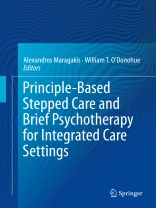This timely volume provides the practitioner with evidence based treatments for many of the clinical problems encountered in integrated care. It applies the core concepts of stepped care to integrating brief mental health interventions as a way to address ongoing problems in the modern healthcare landscape. It sets out in depth the state of the healthcare crisis in terms of costs, staffing and training issues, integration logistics and management, system culture, and a variety of clinical considerations. Central to the book is a best-practice template for providing behavioral stepped care in medical settings, including screening and assessment, levels of intervention and treatment, referrals, and collaboration with primary care and other specialties. Using this format, contributors detail specific challenges of and science-based interventions for a diverse range of common conditions and issues, including:
- Depression.
- Anxiety disorders.
- Adherence to chronic obstructive pulmonary disorder management.
- Alcohol and other substance misuse.
- Attention deficit hyperactivity disorder.
- Chronic pain.
- Neurocognitive disorders.
- Paraphilias: problematic sexual interests.[WU3]
- Sexual abuse and PTSD in children.
A solid roadmap for widescale reform, Principle-Based Stepped Care and Brief Psychotherapy for Integrated Care Settings is deeply informative reading for health psychologists, social workers, psychiatrists, and clinical psychologists. It also clarifies the research agenda for thoseseeking improvements in healthcare quality and delivery and patient satisfaction.
Tabla de materias
Introduction: the need for principle-based stepped care in integrated care settings.- Depression.- Generalized anxiety disorder.- Pain disorder.- Social anxiety disorder.- Bereavement.- Suicide.- Obsessive-compulsive disorder.- Substance abuse.- Conduct disorder.- Nocturnal enuresis.- Encopresis.- School refusal.- Sexual trauma.- Chronic pain.- Eating disorders.- Adult insomnia and other sleep disorders.- Smoking.- Obesity.- Sexual dysfunction.- Marital problems.- Intimate partner and domestic violence.- Medication adherence.- Multicultural considerations.- Oppositional defiant disorders.- Tics.- Agoraphobia.- Bipolar disorder.- Borderline personality disorder.- Child physical abuse.- Dementia.- Delusional thinking.- Erectile dysfunction.- Gambling disorder.- Hypochondriasis.- Intermittent explosive disorder.- Irritable bowel syndrome.- Treating Low Sexual Desire Disorder in Integrated Settings.- Nail biting.- Nonadherece to treatment.- Pediatric feeding disorders.- Pediatric insomnia.- Pica.- Premenstrual syndrome.- Post-traumatic stress disorder.- Recurrent headaches.- Schizophrenia.- Self-injrious behavior.- Separatoin anxiety disorder.- Sexual pain disorders.- Specific phobias.- Sleep terrors.- Smoking.- Stress.- Thumb sucking.- Diabetes.- Adherence to chronic obstructive pulmonary disease.- Food aversion from cancer treatment.- HIV/AIDS interventions.- Conclusion.
Sobre el autor
Alexandros Maragakis, Ph.D. is an assistant professor at the Eastern Michigan University, with a particular interest in integrated care treatment delivery and training. He has provided direct service to clients and consultation in implementing integrated health care and quality improvement principles within community health centers. He has published numerous articles and book chapters in regards to integrated care treatment delivery and outcomes in various settings, including Integrated Primary and Behavioral Care (Springer, 2015) and Quality Improvement in Behavioral Health (Springer, 2016).
William O’Donohue, Ph.D. is a licensed psychologist and a professor of psychology at the University of Nevada, Reno, and an adjunct professor in the department of philosophy and a faculty member of the National Judicial College. He has published over 70 books, and 150 journal articles and book chapters. He holds advanced degrees both in philosophy and psychology. For the past 14 years, he has been director of a free clinic that treats children who have been sexually abused and adults who have been sexually assaulted.












